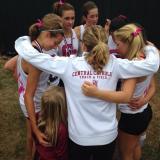Folders |
Running Issues: Talking About PeriodsPublished by
Coaches, Here’s How To Actually Talk About The Menstrual Cycle By Elizabeth Carey for DyeStat It bears repeating: Periods are an essential vital sign for athletes. In fact, the menstrual cycle is not simply an indicator of health and development, but also an important rite of passage. That’s why I encourage coaches and athletes to learn and talk about them. Why? To debunk myths (including that missing periods means you’re fit, or a period will ruin a race, or that hormone-related symptoms are hysteria). To fight stigma (which contributes to confusion, shame, and silence, plus delay of care for important medical conditions). In an ideal world, coaches would stay on top of the latest research, acknowledge the complexity of the hypothalumus-pituitary-gonadal axis, and recognize that the endocrine, nervous, and reproductive systems work in tandem to affect health, training and performance. But we live in the real world. Here, in the real world, coaches should understand the basics of the menstrual cycle, red flags, and potential implications for athletes (which I’ve covered in previous columns and in my book Girls Running and work with Melody Fairchild) so they can share this wisdom with athletes. Coaches are uniquely positioned to start the conversation — and then keep the dialogue going and adjusting course as needed. So what, exactly do you say? Here are six conversation-starters. “Periods are an important vital sign.” Bring this up wherever, whenever — in general communication, at pre-season meetings, with administrators, with captains, or by bringing in a guest speaker to address the topic. You know how you talk about hydrating, sleep, core, shoes and ferritin? Add this to that list. In lockstep with sufficient training and recovery, healthy hormone levels (and signs of them) will help your athletes reach their potential. “Track your cycle.” Every body is different, and so are most cycles, especially during puberty. But as menstruating athletes mature, their bodies will settle into their own unique rhythms. That’s why athletes should track their cycles, including dates and symptoms from Day 1 (when bleeding starts) to Day X (the day before bleeding starts, likely between day number 22 and 44). This practice invites athletes to tune into their own bodies (and minds), and can assist medical providers when needed. Whether athletes use an app like FitrWoman or Clue or go analog with pen and paper or a training log like the Believe Training Journal, collecting data and reflecting on it — without judgment — is an empowering experiment. “Help yourself.” Stock period products or ask your athletic trainer to. Let your athletes know if they need tampons or pads, they can grab them from the first aid kit or another designated area, no questions asked. “We’re here for you and will hear you out.” Know you might not have the whole picture when, say, Sally is dragging on an interval day. She might feel cruddy during a specific phase of her cycle; and that doesn’t mean her fitness or season is lost. Whether she feels comfortable disclosing what’s going on comes down to your relationship. Do athletes trust you, and do you trust your athletes, to be open, honest and direct? Do you listen? Are you supportive and respectful of both individuals and boundaries? “The best training is written in pencil.” Is your training approach flexible enough to make the most of rough patches as well as good days? How we, as coaches, accommodate real-life, behind-the-scenes stuff often dictates how a season (and running career) goes. Can you adjust training and recovery to fit an individual or at least take the long view? Do you emphasize resiliency-boosting practices like mindfulness and skills like breathing and visualization? “I don’t know, but can help you find out.” It’s OK to not know the answer to athletes’ specific questions or concerns. Just being there for them to ask is a big step! Encourage athletes to seek medical care from licensed, credentialed experts who understand and respect developing and menstruating athletes. ###
|





